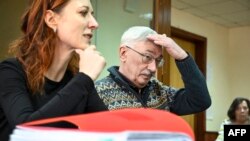Russian prosecutors are seeking to imprison the co-chair of the Nobel Prize-winning human rights group Memorial for nearly three years over an article he wrote criticizing Russia’s 2022 invasion of Ukraine.
During a hearing Monday in Moscow, prosecutors accused 70-year-old Oleg Orlov of “repeatedly discrediting” the Russian army. Orlov, who was in the courtroom, described his trial as a “strangulation of freedom.”
Authorities charged Orlov after the article was published. Back in October, a court convicted him and fined him the equivalent of $1,600, a comparatively lower punishment than others who have criticized the ongoing war. The prosecution appealed, prompting this retrial.
This time, Russian prosecutors are seeking a stronger punishment, aiming for a sentence of two years and 11 months.
A verdict is expected Tuesday.
Russia has been relentlessly clamping down on dissent in the two years since it invaded Ukraine in what it has termed a special military operation.
During the hearing, many of Orlov’s supporters were in attendance. According to Russian independent media outlet Mediazona, more than 100 of his supporters were present, along with more than a dozen Western diplomats.
Memorial said that prosecutors accused Orlov of “political hatred of Russia,” which he has denied.
During Monday’s hearing, Orlov was seen largely not engaging with court proceedings, instead opting to read The Trial, by Franz Kafka, a book about a character arrested for an unknown crime in a nonsensical legal system.
In closing statements, Orlov said, “Our state of affairs really does have a few things in common with the situation Kafka’s protagonist ended up in — absurdity and tyranny dressed up as formal adherence to some pseudo-legal procedures.”
When speaking in court, he continued to decry Russia’s invasion of Ukraine and President Vladimir Putin’s leadership, calling Russia “fascist.” His comments were broadcast through Memorial’s channel on the Telegram messaging platform.
Orlov said he has committed no crime and regrets nothing.
During the trial, he addressed those whom he said, “are now moving the steamroller of repression forward with their work,” including “government officials, law enforcement officers, judges [and] prosecutors.” Orlov said he wondered if they were “scared themselves… [of] what our country, which you probably love too, is turning into.”
He also condemned the recent death in prison of Russian opposition leader Alexey Navalny. Many Western leaders claim Navalny’s death was Putin’s fault.
The Kremlin has rejected allegations that Putin was involved. Russian prison officials insist the 47-year-old died of “natural causes.”
Orlov said, “All of these are links in the same chain: the death, or rather, the massacre of Alexey, the judicial reprisals against other critics of the regime, including me, the strangulation of freedom in the country [and] the entry of Russian troops into Ukraine.”
Orlov further spoke about Navalny after the trial, while addressing reporters. He said, “What happened to Alexey Navalny… is a terrible tragedy, this… terrible crime and death, murder, weighs like a sword of Damocles [a looming threat] over all political prisoners and we must do something to help them.”
The trial has been condemned internationally. The U.N. special rapporteur on human rights in Russia, Mariana Katzarova, described the trial as a “textbook example of a repressive system,” and an “orchestrated attempt to silence the voices of human rights defenders in Russia and any criticism of the war on Ukraine.”
Some information for this report came from The Associated Press, Agence France Presse and Reuters.







